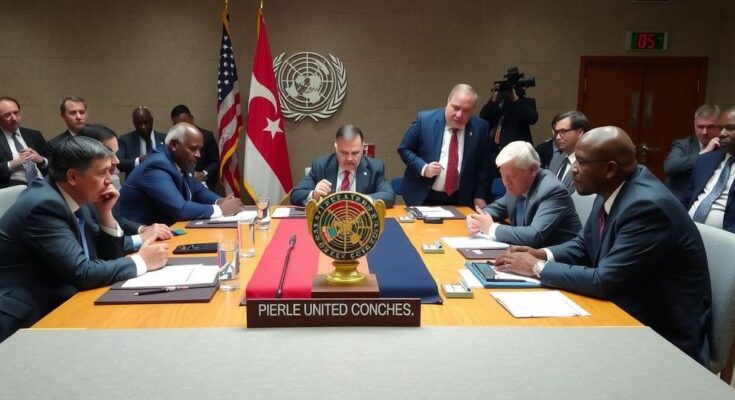The UN Security Council discussed the escalating violence in eastern DRC during a briefing by Bintou Keita, emphasizing the need for comprehensive support for peace initiatives. The ongoing conflict, driven by various armed groups, presents acute humanitarian challenges, particularly regarding gender-based violence. Upcoming regional dialogues and ongoing governance reforms are seen as vital steps towards fostering stability in the region.
On Monday, the UN Security Council received a briefing from Bintou Keita, the UN Special Representative for the Democratic Republic of the Congo (DRC), regarding the critical need to address ongoing violence in the eastern regions of North Kivu and Ituri. Ms. Keita, who also leads the UN Stabilization Mission in the DRC (MONUSCO), reported on the instability caused by armed groups such as the ADF, M23, CODECO, and Zaïre. Despite some progress through mediation efforts, particularly the Luanda process initiated by Angola, the situation remains precarious.
Ms. Keita underscored the importance of a summit scheduled for December 15, which will facilitate dialogue among Angolan, Congolese, and Rwandan leaders, potentially showcasing the advancements made thus far. Nonetheless, she emphasized that sustained support is essential for Angola’s mediating role, proposing that local and regional initiatives must align to ensure enduring peace and stability. Continuing efforts from various stakeholders are critical, particularly in avoiding tensions over constitutional revisions that could destabilize the nation further.
The UN representative highlighted significant governance reforms initiated by Congolese authorities aimed at improving citizens’ purchasing power and access to essential services. Moreover, she acknowledged the recent signing of a ceasefire agreement between the DRC and Rwanda, reinforcing efforts to monitor and verify the accord’s implementation through the Reinforced Ad-hoc Verification Mechanism (R-AVM) launched in Goma.
The violence in North Kivu and Ituri, however, persists, with the M23 perpetrating severe civil and military dominance, controlling extensive territories. The ADF has been particularly deadly, responsible for numerous civilian deaths in recent months. Additionally, the exploitation of natural resources in these regions exacerbates the violence, necessitating coordinated efforts among countries in the Great Lakes area to combat illegal resource extraction and support accountability mechanisms.
As humanitarian conditions deteriorate, compounded by climate-induced challenges, nearly 6.4 million individuals face displacement due to armed conflict. Humanitarian funding has seen some improvement, with over 50 percent of the 2024 Humanitarian Response Plan secured. Moreover, the alarming rise in gender-based violence in the DRC remains a significant concern, with over 90,000 documented cases this year, particularly affecting women in North Kivu.
Concluding her briefing, Ms. Keita reiterated her commitment to addressing these pressing issues, calling for a multi-faceted approach that not only includes military measures but also emphasizes the protection of vulnerable populations and the involvement of women in peacebuilding efforts. This inclusive strategy is crucial for restoring hope and dignity to those affected by the ongoing conflict in eastern DRC.
The Democratic Republic of the Congo has been embroiled in violence for decades, particularly in its eastern provinces of North Kivu and Ituri. The persistent unrest has been fueled by the activities of various armed groups, which exploit the region’s rich natural resources, often leading to significant humanitarian crises. Political instability, ongoing governance reform, and external mediation efforts have characterized recent attempts to establish peace. The UN plays a significant role in stabilizing the situation through missions like MONUSCO, while regional collaborations are sought to tackle interconnected issues of security, governance, and humanitarian aid.
The UN Security Council’s briefing highlighted the urgent need for sustained international and regional support to address the ongoing violence in eastern DRC. Despite some progress and the upcoming summit aimed at enhancing dialogue among leaders from Angola, Rwanda, and the DRC, the situation remains fragile. Continuous efforts are necessary to ensure the protection of civilians, especially vulnerable populations such as women and children, and to consolidate peace and stability in the region.
Original Source: news.un.org




